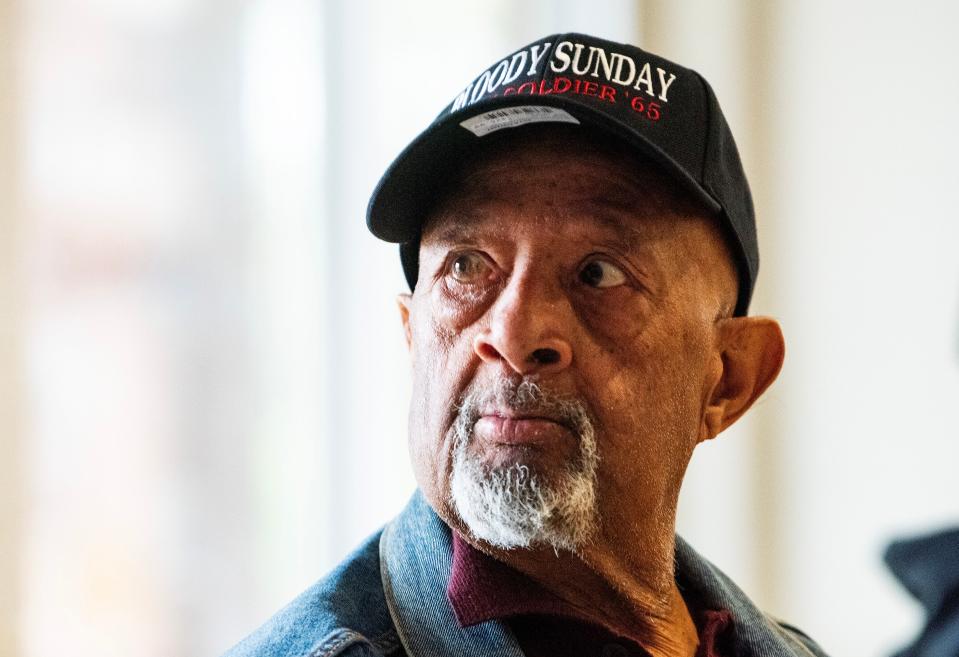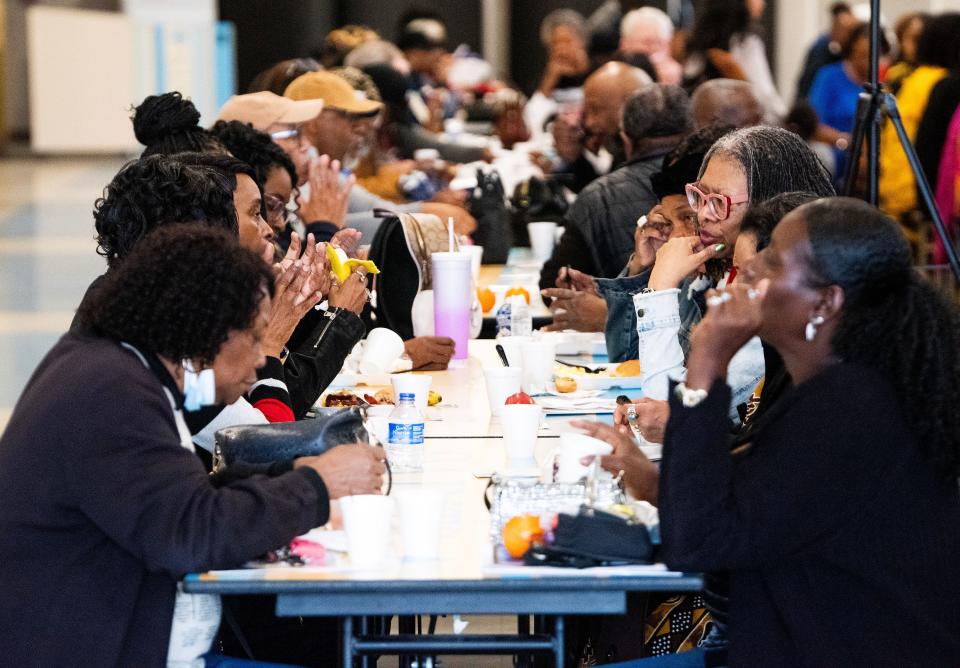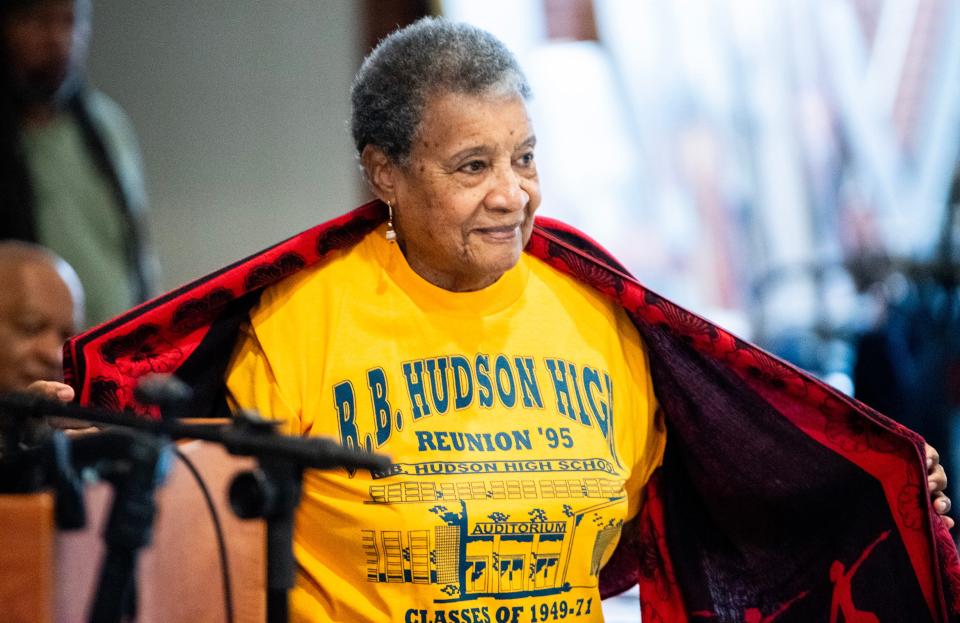Stories from the foot soldiers: Civil rights activists reconnect down memory lane
Chatter buzzed throughout Selma High School Saturday morning as community members, civil rights foot soldiers and their families sat around cafeteria tables to eat breakfast. Foot soldier Charles Mauldin started the Jubilee weekend tradition 19 years ago as a way for everyone who fought for equal rights in the 1960s to reconnect and celebrate one another on an annual basis.
"We sometimes don't really appreciate the small things that people do. We always look at with the big things people do, but those small things added up to the creation of a movement," Mauldin said. "We want to respect that."
A number of foot soldiers were honored Saturday morning, including those who have recently died. Here is a collection of some of the stories the activists and their families shared:

'He almost paid the ultimate price'
Leroy Moton Jr. remembers the day he first heard about his father's civil rights legacy. He was seven years old, riding in the backseat of his dad's car as it flew down US 80.
They passed a spot that looked familiar, and Moton Sr. launched into the story of the time he played dead in Viola Liuzzo's passenger seat to avoid being murdered by the Ku Klux Klan. Liuzzo was the only white woman murdered in the violence surrounding the Civil Rights Movement.
The pair had been ferrying participants in the 1965 Selma to Montgomery March back and forth, and on the final day of the march, Luizzo was shuttling Moton back to the capital. Before they could make it out of Selma, though, a group of KKK members spotted them. According to the testimony of one of the assailants, the men hoped that killing a 39-year-old white woman supporting Black voting rights and a Black, teenage activist would send a clear message to those trying to change things in the South.
The KKK members followed Luizzo and Moton for about 20 miles before racing up beside them and firing a gun into the car. Luizzo died immediately, and when the car ran off the road, an unharmed Moton pretended to be dead.
"He almost paid the ultimate price for our freedom and our right to vote," event facilitator Joyce O'Neal said Saturday.
The situation increased increased support for the Voting Rights Act of 1965, and it also moved President Lyndon Johnson to order a federal investigation of the KKK, according to the Encyclopedia of Alabama.
"He told me the story, and even then turning seven, I knew the importance," Moton Jr. said. "If that incident had never happened, we wouldn't even know if Black people would be able to vote now."
Moton Jr. said a lot of people know his dad as the lanky teenager who survived the infamous murder, but few know what happened to him after that. He moved to Connecticut and started a family.
"He was an amazing individual," Moton Jr. said. "After that event, he lived a very fulfilled life, and he was always honored when he came back down to Alabama."
Moton Sr. died in September 2023 at the age of 78.
The mother of activists
In 1965, Eva Alexander was the mother of five children in Selma. When youth protests and nonviolent demonstrations for civil rights began cropping up in the area, her children all wanted to get involved. She drew the line at double digits, allowing her oldest three kids to participate, but keeping her nine-year-old Lynette home with her baby sister.
"I didn't understand," Lynette Fuller said on Saturday. "I tugged on her, and I tugged. I wanted so badly to be a part of the Civil Rights Movement."

After weeks of begging, as the movement reached a crescendo, Alexander gave in. She took Fuller by the hand and boarded a Greyhound bus to Montgomery. They reached the city just in time to stand in front of the Alabama state Capitol, demanding equal voting rights.
"We were there," Fuller said. "We didn't actually march, but we were there."
The memory has grown hazy over the years, but she said she's proud to have it.
Alexander, now 95 years old, received a certificate acknowledging her valuable contributions to the 1965 voting rights efforts.
Legitimizing the 'young rebels'
Louretta Wimberley taught at the defunct R.B. Hudson High School in Selma during the 1960s, and she remembers the energy that shifted in the halls when the Civil Rights Movement kicked into high gear.
Breakfast organizers Mauldin and O'Neal were two of her students around that time.

"Without them, I don't think the movement would have been as successful," Wimberley said. "I want to give honor and thank them for their bravery."
She recalled the day after the 16th Street Baptist Church bombing in Birmingham. Her students showed up for class, and shortly thereafter, in an organized fashion, they filed out of the school to protest.
This was one of many protests she witnessed.
Wimberley also participated in the teachers march to the Dallas County Courthouse. She remembers some community members calling for the superintendent to punish the teachers who participated, but that never happened.
"They knew we had to be there to teach the children," Wimberley said.
Mauldin said the protest is not very well known, but it meant a lot to him and his peers.
"We felt like villains because be were going to jail and protesting," he said. "It's because of people like Mrs. Wimberley who gave young rebels like me legitimacy. We knew that we were right."
Other honorees
Many others were honored during the event, including Earnest Carter, Charles A. Lingo, John Pettaway and Richard Smiley.
Mauldin said he looks forward to keeping the tradition going next year when the 60th anniversary of Bloody Sunday comes around.
Hadley Hitson covers children's health, education and welfare for the Montgomery Advertiser. She can be reached at hhitson@gannett.com. To support her work,subscribe to the Advertiser.
This article originally appeared on Montgomery Advertiser: 3 foot soldier stories to know ahead of Bloody Sunday anniversary

